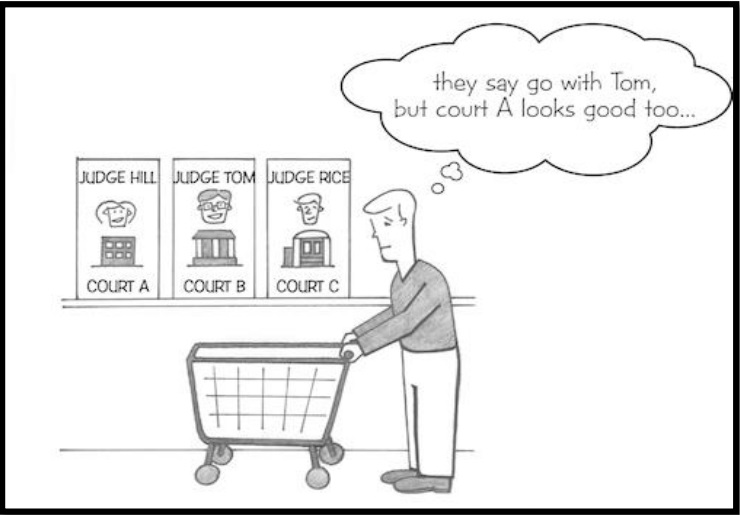Forum Shopping, meaning?
Forum shopping is defined as the practice of choosing competency of a court (jurisdiction) for any dispute, to get the most favorable decision.
Speaking tersely, forum shopping in broader context is a practice of seeking dispute resolution of a complaint from certain jurisdiction which has become “plaintiff friendly” as per believe of suitors and thereby attracting large numbers of lawsuit despite little or no connection between the legal matters and the jurisdiction in which they are to be prosecuted.

Forum shopping as per Merriam Webster:- The legal definition of forum shopping as per the Webster dictionary is “the practice of choosing the court in which to bring an action from among those courts that could properly exercise jurisdiction based on a determination of which court is likely to provide the most favorable outcome.”
Types of forum shopping:
The concept of forum shopping can be further segregated into two major sub heads:
- Domestic forum shopping: Domestic Forum shopping occurs when a Plaintiff chooses between two or more Courts within a single country’s legal system.
- Transnational forum shopping: Occurs where there is a choice between the Courts of two or more countries’ legal systems.
It refers to the practice adopted by some litigants of having their case heard in the court which is most likely to provide a favorable judgment. In India, so-called forum shopping is not permitted as such. However, the existence of tangled procedural laws makes forum shopping in India quite common.
Indian Judiciary on Forum Shopping
The concept of ‘Forum Shopping’ has not been rendered an exclusive definition in any Indian Statute. However, the Indian Judiciary’s observation and obiter dicta has aided in streamlining the concept of Forum Shopping in the Indian Legal System. The Judiciary has time and again condemned the practice of forum shopping by litigants and termed it as an abuse of law.
Observation of Supreme Court of India:
One of the earliest cases in which the Indian Supreme Court condemned the practice of forum shopping is the case of M/s Chetak Construction Ltd. v. Om Prakash & Ors., wherein the Court opined that any attempt on the part of any litigant to go “forum shopping” cannot be allowed as a litigant cannot be permitted choice ‘of the ‘forum’ and every attempt at “forum shopping” must be crushed with a heavy hand.
The Hon’ble Supreme court further opined”Unscrupulous litigants cannot be allowed to even think of indulging in “forum-shopping” to get favorable decisions and it is a “deprecable conduct” in the field of law”. A bench of justices Dipak Misra and U.U Lalit referred to the “principle of judicial decorum, discipline and propriety” and said if a judge, who hears and declines relief to a litigant, should be adjudicating the subsequent pleas if he is very much there.
“On a perusal of the aforesaid authorities, it is clear to us that the learned judge, who has declined to entertain the prayer for grant of bail, if available, should hear the second bail application or the successive bail applications. It is in consonance with the principle of judicial decorum, discipline and propriety.
The Hon’ble Supreme court held in Union of India & Ors. v. Cipla Ltd. & Ors factors which lead to the practice of forum shopping or choice of forum by the litigants. In this case the Apex Court dealt with the concept of forum shopping at length and also deciphered different categories of forum shopping. The different categories of forum shopping as discussed by the Court are as under:
- When a litigant approaches one Court for relief but does not get desired relief and then approaches another Court for same relief.
- Creating circumstances for the purposes of forum shopping.
- Taking advantage of a view held by a particular High Court in contrast to a different view held by another High Court.
- Go on filing bail applications before different judges until a favorable order is obtained.
- In this case, the Court in order to prevent unscrupulous litigations directed that successive bail applications filed by a litigant shall be tried by the same Judge.
- Approaching different Courts for the same relief by making a minor change in the prayer Clause of the petition.
- Where a litigant makes allegations of a perceived conflict of interest against a judge requiring the judge to recues from the proceedings so that the matter could be transferred to another judge.
In M/S. Sonic Surgical vs National Insurance Company Ltd it was held by Apex Court that if a cause of action has arisen in Ambala, then too the complainant can file a claim petition even in Tamil Nadu or Gauhati or anywhere in India where a branch office of the insurance company is situated because the bench is more likely to grant relief in the favour of complainant. We cannot agree with this contention. It will lead to absurd consequences and lead to bench hunting or Forum Shopping
The Indian Laws governing the concept of territorial jurisdiction are found in the Code of Civil Procedure, 1908 and specific provision is elucidated as below:
Section 20 of CPC provides that every suit shall be instituted in Court within the local limits of whose jurisdiction:
- the Defendant, or each of the Defendants where there are more than one, at the time of the commencement of the suit, actually and voluntarily resides, or carries on business, or personally works for gain; or
- the cause of action, wholly or in part, arises.
Explanation to Section 20 provides that a corporation shall be deemed to carry on business at its sole or principal office in India or, in respect of any cause of action arising at any place where it has also a subordinate office, at such place.
In the case of Union of India v. Ladulal Jain, the Supreme Court had held that, “Section 20 of the Code has been designed to secure that justice might be brought as near as possible to every man’s hearthstone and that the Defendant should not be put to the trouble and expense of travelling long distances in order to defend himself in cases in which he may be involved.”
Conclusion
Forum shopping has been termed as a disreputable practice by the courts and has no sanction and paramountcy in law. Litigants are often in a dilemma about whether to move to a consumer court or approach their respective regulatory authority. It has been condemned and regarded as a deplorable practice by Courts. In view of existence of explicit provisions dealing with the issue of jurisdiction, the litigants cannot be extended the freedom to choose a Forum. Forum shopping has been a common practice not only in India but even in the other countries as well. For instance in the US, it has been reported that more than 40% of patent suits are filed in a Federal Court in East Texas. Similarly, in Germany there is a German Patent Court with technically trained Judges that resolves all patent cases brought in Germany.
The principle of Forum Shopping system has augmented implications in the recent times by virtue of technological advancement and the era of cyberspace. Commercial transactions and advertisement of services are no more restricted to a region or territory. Cyberspace has diminished territorial limits, hence law concerning territorial jurisdiction of Courts has become vulnerable and susceptible to uncertainty regarding place of business and place of cause of action. However, recent decisions of Court have assisted in streamlining the law.
Needless to say, unless such principle is adhered to, there is enormous possibility of forum-shopping which has no sanction in law and definitely, has no sanctity. If the same is allowed to prevail, it is likely to usher in anarchy, whim and caprice and in the ultimate eventuate shake the faith in the adjudicating system. This cannot be allowed to be encouraged,
You may contact me for consultation or advice by visiting Contact Us








